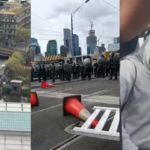Should Police Have Power to Make Paperless Arrests?

Many police officers have reported being “overwhelmed” by paperwork, complaining that it slows them down and takes them away from other duties.
Some claim they often spend hours doing paperwork in a single shift, meaning there are less police out on the street.
It has been said that the prospect of undertaking paperwork acts as a deterrent against police arresting people in the first place.
But late last year, Northern Territory police were given unprecedented powers of arrest – allowing them to arrest and detain people without having to complete to the usual paperwork.
These laws allow police to arrest people and avoid paperwork where police could ordinarily deal with them by way of a warning or infringement notice (fine).
Most of the relevant offences are contained in the NT’s Summary Offences Act, and include offensive language, disorderly conduct, and drug and alcohol offences that can be dealt with by way of infringement notices.
In the NT Parliament’s Second Reading Speech for the laws, it was noted that paperless arrests would save police a significant amount of time and allow them to spend more time on other policing duties.
The laws mean that police can arrest a person and detain them at the police station for up to 4 hours, or until they are sober, without taking the usual notes or filling out the prescribed forms. Police do not even need to allow the arrested person to speak with a lawyer.
Criticism of the law:
The new laws have attracted a great deal of criticism on the basis that they take away an arrested person’s right to speak with a lawyer and, perhaps of even greater concern, remove the accountability of police in the arresting process.
One critic of the laws, Jonathon Hunyor from the North Australian Aboriginal Justice Agency (NAAJA), has said that the laws belong in a police state, not in the Northern Terroritory.
The NAAJA is challenging the laws in the High Court on the basis that they are unconstitutional.
The laws are expected to further disadvantage the NT’s indigenous population at a time when the territory is already suffering a crisis of indigenous imprisonment. Aboriginals make up 85% of the NT prison population, and the new laws are likely to disproportionately target them.
The Human Rights Law Centre (HRLC) also disapproves also disapproves of the laws, pointing out that they give police unfettered discretion to act as they please, taking away much of the power of the court to determine the validity of arrests and thereby undermining the separation of powers. The HRLC believes that the laws will result in many more disadvantaged people being locked up without sufficient basis. It has joined forces with the NAAJA in the High Court action.
Clearly, the laws allow police to act as “judge, jury and executioner” – arresting people without sufficient basis and detaining them without interference from a lawyer or the need to record the reasons for the arrest which may later be scrutinised by a court. They effectively take away a very important check against the misuse of police power – which is the fear of being held to account for unlawful arrest and false imprisonment. They indeed create a situation which can be likened to a “police state” when it comes to arrests for alleged minor indiscretions.
But the NT Attorney General has defended the laws on the basis that they are an effective and efficient way of dealing with “troublemakers”. He claims that they allow police to take people off the streets before they go onto committing more serious crimes later in the night. He describes the powers as a form of “catch and release.”
Senior Lawyer Ruth Barson from the HRLC hopes that the case will be heard sometime this year. We will have to wait and see what the High Court decides.






